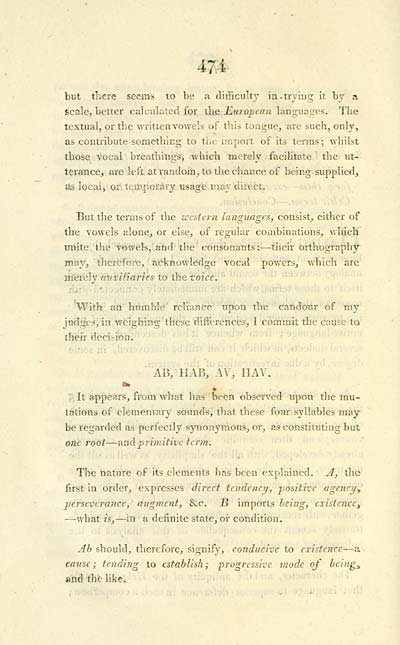Blair Collection > Celtic researches, on the origin, traditions & language, of the ancient Britons
(568)
Download files
Complete book:
Individual page:
Thumbnail gallery: Grid view | List view

474
but there seems to be a ditficully in-trviug it by a
écaìe, better calculated for tlxe European languaircs. The
textual, or the written vowels of this tongue^ are such, only,
as contribute something to the import of its terms; whilst
those vocal breathings, which merely facilitate the ut-
terance, are left at random, to the chance of being supplied,
as local, or temporary usage may direct.
But the terms of the zccstdrn languages, consist, either of
the vowels alone, or else, of regular combinations, which
unite the vowels, and tlie consonants:- — their orthography
may, therefore, acknowledge vocal powers, which are
Biei-ely aiixUiavies to the voice.
"With an humble reliance upon the candour of my
judges, in weighing these differences, 1 commit the cause to
their deri.-ion.
ΛΒ, HAB, AV, IIAV.
It appears, from what has been observed upon the mu-
tations of elementary sounds, that these four syllables may
be regarded as perfectly synonymous, or, as constituting but
one root — ΐχϊ\ά primitive term.
The nature of its elements has been cx[)]aincd. J, the
first in order, expresses direct tendcnci/, positive agenci/,
perseverance, augment, &c. Β imports being, existence^
■ — what is, — in a definite state, or condition.
Ab should, therefore, signify, conducive to existence^a.
cause; tending to establish; progressive mode of beings
and the like.
but there seems to be a ditficully in-trviug it by a
écaìe, better calculated for tlxe European languaircs. The
textual, or the written vowels of this tongue^ are such, only,
as contribute something to the import of its terms; whilst
those vocal breathings, which merely facilitate the ut-
terance, are left at random, to the chance of being supplied,
as local, or temporary usage may direct.
But the terms of the zccstdrn languages, consist, either of
the vowels alone, or else, of regular combinations, which
unite the vowels, and tlie consonants:- — their orthography
may, therefore, acknowledge vocal powers, which are
Biei-ely aiixUiavies to the voice.
"With an humble reliance upon the candour of my
judges, in weighing these differences, 1 commit the cause to
their deri.-ion.
ΛΒ, HAB, AV, IIAV.
It appears, from what has been observed upon the mu-
tations of elementary sounds, that these four syllables may
be regarded as perfectly synonymous, or, as constituting but
one root — ΐχϊ\ά primitive term.
The nature of its elements has been cx[)]aincd. J, the
first in order, expresses direct tendcnci/, positive agenci/,
perseverance, augment, &c. Β imports being, existence^
■ — what is, — in a definite state, or condition.
Ab should, therefore, signify, conducive to existence^a.
cause; tending to establish; progressive mode of beings
and the like.
Set display mode to: Large image | Transcription
Images and transcriptions on this page, including medium image downloads, may be used under the Creative Commons Attribution 4.0 International Licence unless otherwise stated. ![]()
| Early Gaelic Book Collections > Blair Collection > Celtic researches, on the origin, traditions & language, of the ancient Britons > (568) |
|---|
| Permanent URL | https://digital.nls.uk/75770143 |
|---|
| Description | A selection of books from a collection of more than 500 titles, mostly on religious and literary topics. Also includes some material dealing with other Celtic languages and societies. Collection created towards the end of the 19th century by Lady Evelyn Stewart Murray. |
|---|
| Description | Selected items from five 'Special and Named Printed Collections'. Includes books in Gaelic and other Celtic languages, works about the Gaels, their languages, literature, culture and history. |
|---|

